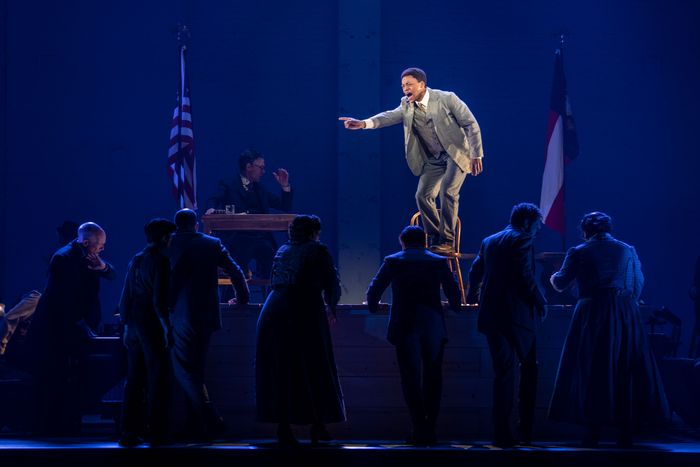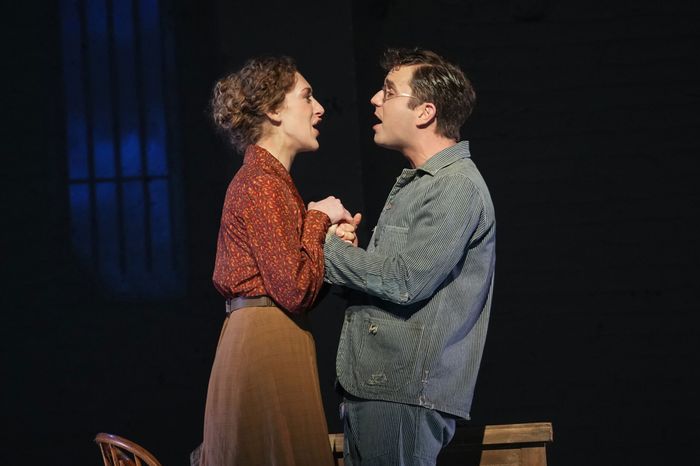
Parade gets the wrong melody stuck in your head, intentionally. The musical opens with a Confederate soldier heading off to war from Marietta, Georgia, delivering a soaring good-bye to his beloved, promising to fight for “The Old Red Hills of Home.” It’s a plaintive melody with a martial undercurrent, waltzing over snare drums. The white members of the cast take it up again as the setting shifts to 1913 and the city of Marietta prepares for its Confederate Memorial Day celebration, and the song becomes a full-blown march for the occasion. “Praise those who’d fight for the old hills of Georgia,” they sing, “for those proud and valiant men, we’ll sing ‘Dixie’ once again.” Leo Frank, the Jewish superintendent of the local pencil factory, thinks the whole event is asinine, but the sticky, creeping quality of that melody should be a warning. Frank will soon be accused of raping and murdering one of the girls who works at his factory and subjected to a trial that quickly becomes an antisemitic media circus. All throughout, Jason Robert Brown’s score keeps reminding you of that melody, the sound of the myths of white supremacy embedded deep in red clay. It rises again, most powerfully, at the end of the show, after a mob has taken Leo and hanged him.
Parade tells you all that is coming from the start. Michael Arden, directing this revival, opens the show by projecting the inscription on a present-day Marietta memorial to Frank over the back of the stage. Even without that, though, the sense of Frank’s doom is baked in from that first melody onward. Parade is about the recurrence of hate, recurring on Broadway at a time when white supremacy is out of the shadows and singing once again. (Neo-Nazis picketed the revival’s first preview.) This production is hyperaware of its context, a self-conscious and self-aware Parade, eager to meet that moment, and it takes off only when it abandons some of that didacticism and follows Brown’s score toward the insights, both grim and lovely, that are best hit in a sweeping and emotional register.
The show hangs on the performance of Leo himself, played in this case by Ben Platt, who is back on Broadway for the first time since his rapid rise to stage fame in Dear Evan Hansen and subsequent ignominy in its film adaptation. He turns out to be just the right fit for Leo, tapping into the character’s neurotic tendencies and Northern standoffishness amid the genteel Southerners around him. He’s spiky and hardheaded, a transplant from Brooklyn with a tendency to talk down to people he dismisses, a habit that trips him up further when it comes to his trial. Platt, so associated with playing a high-schooler, still reads fairly young onstage, bringing out the poignant youth of Leo himself. (Frank was lynched at 31.) Across from him, there’s Micaela Diamond, the youngest of the Cher Show Chers, as Leo’s wife, Lucille, who’s also Jewish but from the South and far more comfortable with the local customs. Often, she’s fed up with Leo for not seeing what’s right in front of him. Diamond labors more than Platt does under the preconceived notions of her character — she clearly is thinking about Carolee Carmello’s distinct, wide-open vibrato from the original 1998 production — and has a slippery grip on an accent that produces one too many ways of saying “Atlanta.” But she, like Platt, is game, earnest, and committed, and both actors warm up to their characters as the show progresses. When in the latter half of the show they jointly deliver Brown’s biggest and most gripping melodies — “This Is Not Over Yet” and “All the Wasted Time” — while cascading across the stage, they’re stirring the production toward tragic grandeur.
Those big capital-R romantic songs, however, rise out of a relatively workmanlike book. Parade premiered 25 years ago, a collaboration among director Hal Prince, playwright Alfred Uhry (of Driving Miss Daisy and The Last Night of Ballyhoo, which along with Parade constitute an Atlanta trilogy), and Brown. It appeared in an era of pageant-like, serious-minded historical musicals like Ragtime. (The production company Livent was involved in both, going bankrupt while Parade was running; its creative director Garth Drabinsky tried to stage a comeback, unsuccessfully, last season with Paradise Square.) At the time, Brown was early in his career (Stephen Sondheim turned down the idea), making his Broadway debut with only a song cycle, Songs for a New World, under his belt. Romance — as his subsequent show The Last Five Years would reveal and Bridges of Madison County would confirm — is his forte. Parade grows in strength and clarity when the lyrics keys into Leo and Lucille’s connection and the chilling fantasies of the Old South. Uhry’s book, on the other hand, is stuffier and closer to earth, with the vigor of an AP U.S. History lesson: The first act is bound up in details of the trial, and the second in Lucille’s attempts to get governor John M. Slaton (Sean Allan Krill) to commute his sentence. The musical also deals poorly with its Black characters, who are written without depth, as figures manipulated by white Southerners out to get the Franks. Brown’s songwriting is weakest in this area. Two Black servants sing, “A Rumblin’ and a Rollin,’” in which they criticize Northerners’ focus on a trial because it has a white victim, which is more an expression of white anxiety about what Black servants might think than any insight into their own perspective. Brown also writes an awkward blues number for a chain gang that includes Jim Conley (Alex Joseph Grayson), the Black cleaner at the factory, who the book implies may have been responsible for the crime for which Frank is on trial. That Implication is uncomfortably treated as a gotcha, like a lead turned up by an amateur detective investigating a true-crime case that goes without further exploration.
In this revival, Arden emphasizes the true-crime elements of the musical to its detriment. The story of Leo’s trial conveys its relevance, but Arden apparently worries that you might miss the message. As the production introduces each character, projections (by Sven Ortel) show us photos of the actual historical figures. You end up thinking too much about how the faces of a Broadway ensemble (chipper, toned, well-hydrated) don’t much resemble the faces of the past. The projections, which also feature contemporaneous headlines and at one point, the Brooklyn Bridge (to remind you where Leo is from) overwhelm what is otherwise a simple staging retained from its “Encores!” origins. Dane Laffrey’s set turns the stage into a perpetual courtroom, with the action occurring on a raised central platform. The design suits the smaller scenes — the Franks look like they’re under scrutiny, even at home — but makes the more comic numbers more awkward. Jay Armstrong Johnson, playing a boozy and opportunistic reporter crowing about “Real Big News,” wears himself out bouncing around his limited space to gesticulate.
By intermission, more than an hour into Arden’s nudging me about the show’s relevance, I was frustrated — but this is the rare musical that improves in its second act. Freer from just being a play-by-play of history, it begins to pursue insights about the texture of it: Frank’s feeling of being trapped, and his connection with Lucille reborn out of hardship. There’s a pageantry to its vision of the South that the score matches and examines, a know-thine-enemy approach. Arden stages Leo’s lynching with clear-eyed horror, and Platt keeps him nobly prickly to the end. In that scene, right before his death, Leo sings the Sh’ma, with the Jewish prayer set to the same melody as “The Old Red Hills of Home.” The pairing of those two things is difficult to untangle, but the moment hits deep and unsettles. It strikes intuitively and emotionally in a way that a recitation of the facts could not.
Parade is at the Jacobs Theatre.



